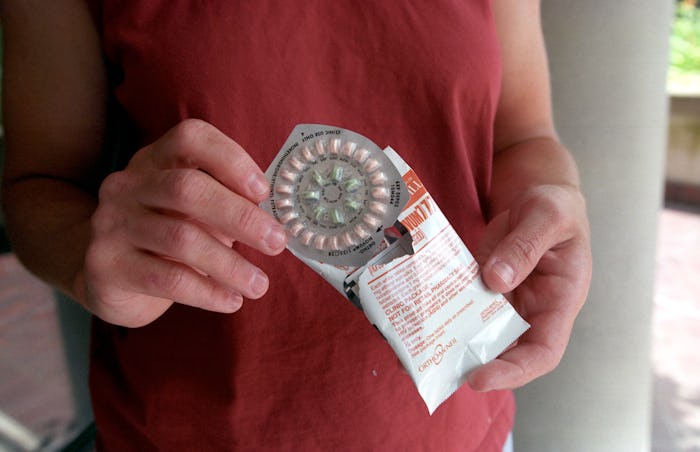News

Access To Birth Control Can Affect A Woman's Paycheck
There are a lot of advantages that come from using birth control: better family planning and hormonal regulation, to name a couple. But it turns out that there is a financial upside to birth control access as well. In fact, as this statistic shows, access to birth control can affect a woman's paycheck and, as such, there's a strong argument to made a for reproductive rights. Because when women are able to acquire reliable forms of birth control, there are lasting benefits for individuals, families, and even society as a whole.
Champions of Global Reproductive Rights (PAI) released a graphic in 2013, which is circulating on Twitter again recently, that lays out the ways in which the economy is positively impacted by women's access to contraceptives. According to PAI, women with access to birth control tend to earn more money than those who do not — 40 percent more, to be exact.
The graphic, entitled "The Economics of Birth Control," explains that 222 million women want to delay or avoid getting pregnant but require birth control to do so. Additionally, 73 percent of the women who are without access to birth control live in the 69 poorest countries around the globe. Family planning advocates have pointed to contraception as a necessary factor in breaking the poverty cycle for years, but many impoverished women remain without.
According to PAI, women with access to birth control have smaller families, live longer lives, and have increased incomes — all of which bolster the economy. Women with contraception are able to create a more stable career and go on to earn more money with less time away from the job.
Essentially, an investment in family planning is an investment in the economy. The PAI graphic shows that when money is invested in women's health and contraception, there is a significant decrease in spending on education, water and sanitation, and immunizations.
America has experienced many of the long-term positive effects of increased access to birth control. Researchers from the Universities of Michigan and Virginia recently found that the pill has empowered young women to be career-minded in recent decades. They even went so far as to attribute a 10 percent closing of the gender pay gap in the 1980s and 31 percent in the 1990s to the increased availability of the pill. Similarly, according to Planned Parenthood, access to birth control has also allowed significantly more women to obtain higher education.
This may be in part due to the declining rate of teen pregnancies — as high as 86 percent, according to PP. When women are free to focus on bettering themselves without constant fear of getting pregnant, they are able to achieve more.
Improvements in health, education, and economic success support the argument for reproductive freedom. Regardless of whether you believe the costs should be shouldered by the taxpayers, employers, or individuals, it's hard to argue against the shared benefits of empowering women to prevent or delay pregnancies.